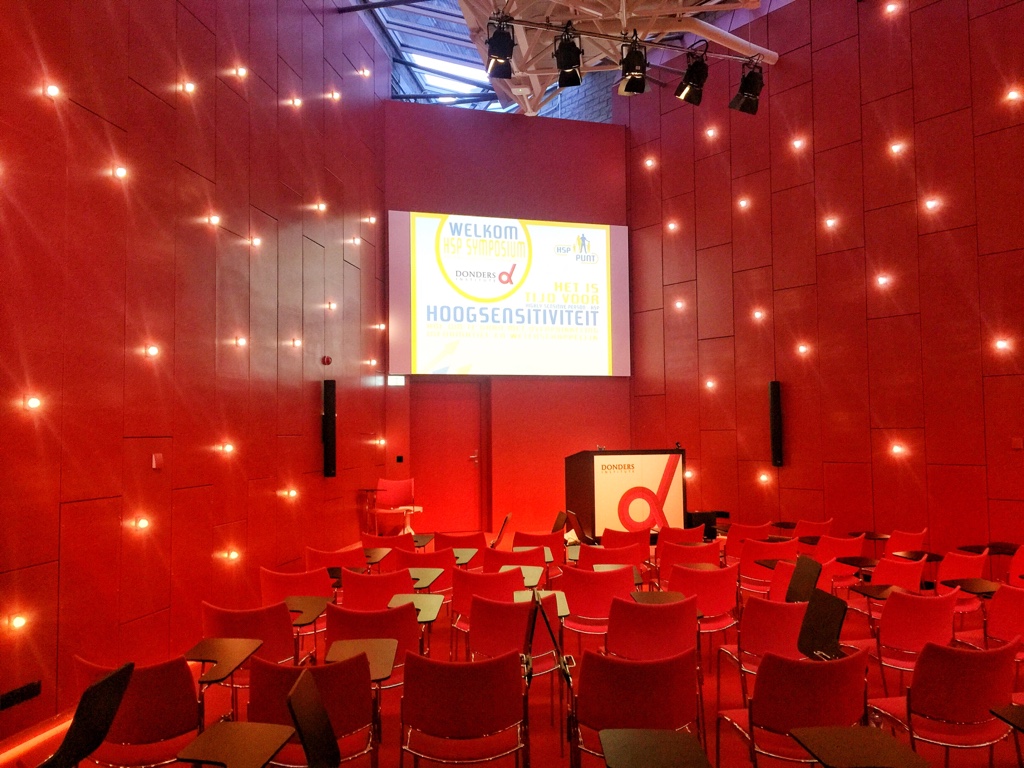This post is also available in Dutch.
High sensitive personality is not a weakness but can actually grow to be a strength. That was what experience experts made clear at the public symposium on HSP at the Donders Institute.

Image of the Donders Institute where the HSP symposium took place.
If you want to know what HSP (highly sensitive person) is first, then check out this blog here.
HSP is not a disorder but a personality trait
Everybody perceives the world in their own way. Estimations are that approximately 20 % of people respond in a highly sensitive way to their surroundings. This means that HSP is a normal and common phenomenon within the population (‘a normal distribution’). HSP does not only cause negative effects, as is often suggested in the media. It can also have its benefits. Examples are easy excitability, but also aesthetic sensitivity are a part of HSP. Put differently, on the one hand there is high responsiveness to sounds, for example. On the other hand
though, it can increase the perception of small nuances, which is often accompanied with openness and creativity.
Still little scientific knowledge on HSP
There is a clear gap between societal interest and science. While there is ample media coverage on HSP, there are merely 70 scientific articles. Many different approaches could stimulate scientific progress, for example by working on a better description of HSP such that it would make the measurement of HSP more objective and more precise. Current HSP questionnaires mainly focus too much on the negative aspects and too little on the positive sides. These questionnaires are not broad enough and could skew the image of HSP, preventing us from getting new insights. Highly sensitive individuals who do not experience any problems with their HSP might not identify with the negative aspects of the questionnaire. In this way, new knowledge of HSP could be lost.
What scientific knowledge on HSP do we have?
A brain researcher from the Donders Institute, Judith Homberg, spoke about her research where rats were tested on their sensitivity to external stimulation. First, she selected the rats based on their behaviour and sensitivity to sensory stimulation. In this way, she was able to form groups of sensitive and non-sensitive rats. She found that sensitive rats not only perceive sensory information faster, but also that they need less stimulation from their surroundings. To investigate this, she stimulated the whiskers (perceptual organ in rodents) and observed that cells in the sensitive rats respond much faster than in the non-sensitive rats. This research might have found the first neurobiological indication of why highly sensitive persons respond more strongly to information from their environment.
What can you do as an HSP’er?
Many people experiencing HSP shared their stories during the symposium. They shared their negative experiences with HSP and their daily struggle with it. Many older people with HSP said they considered their HSP a weakness until they found a way to deal with it. From then on, they considered it more as a strength. These speakers advised HSP’ers to accept that this is the way they are. That is why HSP’ers should learn to not automatically adapt to their environment but draw clear boundaries and take rest more often.
Many individuals who struggle with HSP are recognized as HSP’ers, while also many other people with HSP characteristics are out there and do not experience any trouble. What exactly makes for this distinction might be a possible future research question.
One of the comments of Corina Greven, co-organiser of the HSP-symposium, was: ‘There is a large gap between societal interest and scientific knowledge on HSP. We should do more thorough research into the different features of HSP.’
Written by Mahur, edited by Jill, translated by Rowena
The HSP-symposium was organised by two researchers of the Donders Institute, Corina Greven and Judith Homberg, and societal partners of hsp-point.
